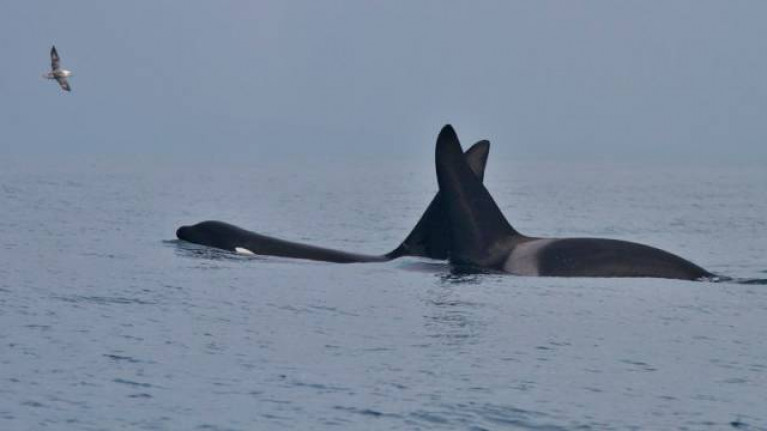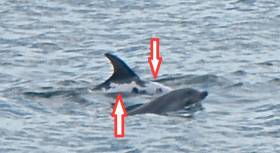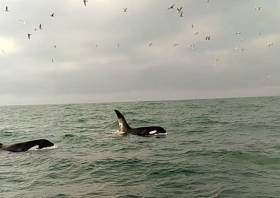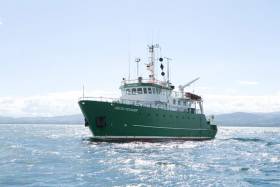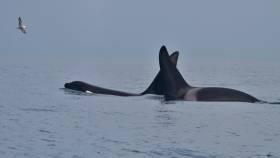Displaying items by tag: orcas
Widespread characterisation of orca whale interactions with yachts as “attacks” is “heavily loaded and highly contestable”, according to an article in The London Review of Books.
Over the past three years, a number of yachts have been sunk in encounters with the whales in an area now known as “Orca Alley” near the Straits of Gibraltar and off the Iberian peninsula.
As London Review of Books contributing editor Francis Gooding writes, at least 11 individual whales in a small population of around 40 have been identified as participants.
Orcas are “thought to indulge in behavioural fads, which can spread through groups quickly before petering out,” he writes.
“The most famous of these involved three pods in Puget Sound that in 1987 spent a few weeks carrying dead salmon around on their heads; in 2005, groups in the same area seemed to experience a less benign craze for tormenting and sometimes killing harbour porpoises, a species they do not eat,” Gooding states.
Human pressures on the environment, such as the longline fisheries for tuna, have been cited as one reason by a working group which studied Iberian orca behaviour.
However, Gooding recalls a period in history where orcas and humans hunted together. From the 1820s, pods of orcas near Twofold Bay in New South Wales assisted the men of the Eden whaling station in killing of baleen whales.
“Specialised focus, communicative teamwork and great adaptability means that – also like human beings – orcas can have a hugely disruptive effect on ecosystems when they choose to turn their attention to a new source of food,”he writes.
He cites Hal Whitehead and Luke Rendell, authors of The Cultural Lives of Whales and Dolphins, who documented how a small group of orcas near the coastal kelp forests of the Aleutian Islands started hunting sea otters in the 1990s.
Having almost eliminated the otters from a large area of the Aleutian coast, the kelp-eating sea urchins, which had been controlled by the otters, then “mowed down” the kelp forests, and left a barren seascape.
“Orcas may have had impacts on the ocean not dissimilar to the ways early humans affected terrestrial ecosystems, and as far as ecologically destructive overkilling goes, it is even possible that the deep history of the orca as a hunter contains a parallel with the rapacity of human behaviour,” Gooding writes.
“The appearance of orcas around ten million years ago correlates with the sudden and mysterious disappearance of more than half the known species of cetaceans, seals and sirenians (dugongs and manatees) from the fossil record,” he writes.
“As with the widespread extirpation of terrestrial megafauna from areas colonised by humans during the Pleistocene, one hypothesis is that orcas, as they expanded into new marine ecosystems, hunted many existing sea mammals to extinction,” he says.
Read the full article in The London Review of Books here
A scientist researching orca attacks on yachts off the Iberian coast says they are doing it for the “adrenaline shot”.
As The Evening Standard reports, marine biologist Renaud de Stephanis said he believed the whales were ramming boats for fun, and not out of malice.
At least three boats have sunk in some 500 incidents recorded since 2020.
“Don’t ask me how they started it because I don’t know, and I don’t think anyone ever will. What we do think is that it is a simple game for them,” de Stephanis is quoted as saying.
He is completing a report on the orca behaviour for the Spanish Ministry of Ecological Transition.
He referred to one particular orca that has a deep scar on its back, believed to have been caused by hitting an engine propeller.
“She belongs to a family of seven members and as far as we know, she is the most active of all,” he said.
Underwater cameras have helped researchers capture numerous videos of the incidents since they began in 2020.
A separate report published by LiveScience in May of this year quoted scientists who believe a traumatic event may have triggered a change in behaviour of one orca which the rest of the Iberian orca population had learned to imitate.
Marine biologist Alfredo López Fernandez of the University of Aveiro in Portugal and representative of the Grupo de Trabajo Orca Atlántica, or Atlantic Orca Working Group, said that “ defensive behaviour based on trauma, as the origin of all this, gains more strength for us every day”.
The Iberian orca population is listed as critically endangered, with just 39 of the animals recorded in the last census in 2011.
A boat captain has shared video of the moment his vessel was ambushed by an orca in the Strait of Gibraltar, as Newsweek reports.
The footage captured by Dan Kriz documents one of a spate of attacks by orcas on vessels in the area since spring, leaving experts baffled.
It’s not the first time that Kriz has felt the wrath of such marine wildlife, as he recounts being ambushed in the same stretch of water in 2020.
But he characterises his most recent ordeal on 15 April as more deliberate.
“It didn’t take them that long to destroy both rudders,” he said. “Looks like they knew exactly what they are doing. They didn’t touch anything else.”
Marine wildlife experts are divided over this unusual behaviour, with some attributing it to mere play while others suggest it could be one vengeful orca teaching others how to attack the boats.
Newsweek has more on the story HERE.
Chance to Join Orca and Humpback Adventure in Norway With Top Yachting Photographer Next Month
Join top yachting photographer Rick Tomlinson for a week-long adventure photographing orcas and humpback whales as they hunt for the herring in the fjords around Tromsø in Norway from 9-16 November.
The group will board the expedition yacht Qilak in Tromsø and explore the fjords close by, photographing the whales by day then anchoring each evening in remote coves away from all light pollution to hopefully see the northern lights.
This exclusive trip with the Cowes-based marine snapper is limited to just six guests, priced from €3,100 per person including full board.
For more information, get in touch Rick Tomlinson at [email protected].
A pair of killer whales from a unique group have been sighted off the Kerry coast, as Radio Kerry reports.
The Irish Whale and Dolphin Group (IWDG) has identified the two male orcas seen off Bray Head on Valentia Island this week as the last known surviving members of the Scottish West Coast Community Group.
And according to the Mirror, it marks the second sighting for the pair in this area within the last three months.
Studied for years by marine scientists due to isolation their genetic distinctiveness from other orcas in the North Atlantic region, these marine mammals commonly feed in the Hebridean Islands.
Killer whales return to Bray Head, Valentia Island, Co. Kerry!
— Irish Whale and Dolphin Group (@IWDGnews) July 21, 2022
Thanks to Nicky Sheehan from Skellig Michael Cruises and Dr.Connie Kelleher for reporting their sightings to us.These sightings provide insight into how killer whales forage both in Irish coastal waters and elsewhere. pic.twitter.com/9AdtWrS72P
But they’ve previously been found as far as Scotland’s east coast, Lough Swilly in Donegal and four years ago off the Blasket Islands, likely in search of food.
Experts have feared for some time that this orca pod has been nearing its end. It last calved more than 30 years ago and has shrunk from around 20 individuals in the 1980s to just two known members, John Coe and Aquarius, as of 2016.
NI Surfer’s Close Encounter With Killer Whales Off Donegal
A surfer from Northern Ireland got more than he bargained for when he was chased by a pod of killer whales off Donegal last week.
As the News Letter reports, Derry man Ryan Vail was catching waves off Culdaff on the Inishowen Peninsula last Friday (11 September) when he found himself surrounded by the orca pod consisting of two adults and three juveniles.
Orcas are a rare sight in Irish inshore waters, but the marine wildlife are no strangers to Donegal.
A pod resident in western Scotland has been spotted in Lough Swilly before, and more recently in Strangford Lough, but it has not calved in many years — suggesting these visitors may come from elsewhere.
“I’m well used to the water and have seen basking sharks, dolphins and porpoises, so I knew it definitely wasn’t one of them,” Ryan said.
“I knew what I was looking at, so I also knew I shouldn’t be this close! So, there was a wee bit of panic.”
And that panic only grew when one of the smaller orcas — “the size of a Transit van” — made an aggressive dash for Ryan on his board.
The News Letter has more on the story HERE.
Sightings of an unusual looking bottlenose dolphin off the East Coast in recent weeks have turned out to be a Scottish scrapper named Spirtle.
Images of the dolphin seen off South Dublin and North Wicklow earlier this month showed what appeared to be heavy scarring and discolouration on its right flank.
That was enough for Dr Joanne O’Brien of the Irish Whale and Dolphin Group (IWDG) to identify the animal as the daughter of a dolphin well known in the Moray Firth.
Spirtle’s story is one of survival as almost three years ago to this day, she was found live stranded with significant injuries and suffering severe dehydration.
Since then she’s bounced right back from the brink of death, and it appears she’s now even at the lead of a group of bottlenose dolphins that’s made its way south along the Irish Sea beyond Dublin Bay.
A rare sighting of a different kind was made in West Cork this past week, where a charter boat operator witnessed what he believed was an attack on a pod of common dolphins by a killer whale.
David Edwards was 15 miles south of Galley Head last Tuesday (21 May) when he saw the orca chase after its fellow cetaceans for its lunch — and his images of the event have been confirmed by IWDG sightings officer Padraig Whooley.
Echo Live has more on the story HERE.
Killer Whales Spotted Off Dublin Coast May be Same That Visited Blasket Islands Earlier This Year
#MarineWildlife - Video posted on social media over the weekend of two killer whales spotted off the Co Dublin coast has gone viral.
Trawlerman James Mac Cluskey used his phone to record a few seconds’ glimpse of the pair of male orcas, which came close to his boat some 8km off Rockabill on Saturday afternoon (17 November).
According to the Irish Whale and Dolphin Group (IWDG), it’s the second sighting of the largest species in the dolphin family off the East Coast in recent weeks, with another fisherman reporting an encounter some 22km off Skerries on 30 October.
And it’s believed the duo may be part of the Scottish West Coast Community Group, a unique orca pod long under threat of extinction owning to not having produced any calves for years.
Earlier this year, whales from this group were identified feeding off the Blasket Islands in Co Kerry, showing just how far their range extends.
‘Operation Orca’ Set To Survey Scottish Killer Whales On Celtic Voyager
#MarineWildlife - The RV Celtic Voyager departed the Port of Cork yesterday (Wednesday 24 October) for ‘Operation Orca’, a 12-day survey of an offshore killer whale community associated with the Northeast Atlantic mackerel fishery.
A team of marine scientists from University College Cork is on board the research vessel that’s headed to waters east of the Orkneys, to study the orcas that feed on mackerel between October and February each year.
“This is the first time a dedicated research vessel will be heading up to study these killer whales and we are hopeful to come back with a lot of data,” said PhD researcher and chief scientist Róisín Pinfield in her introductory blog for the survey.
“We will have cameras, GoPros, drones, underwater hydrophones collecting acoustic data so we can hear the killer whales and a RIB so we can get in close if weather conditions allow. Time to pray to the weather gods to keep the storms away!”
The Scientists@Sea blog will be regularly updated by the Celtic Voyager team once they reach the fishing grounds and begin their survey, which runs till Sunday 4 November.
#MarineWildlife - Two killer whales spotted feeding off the Blasket Islands earlier this week have been identified as members of a unique pod from Scotland.
“Killer whale sightings in any Irish waters are rare events, and they seem to be getting rarer,” said Pádraig Wholley of the Irish Whale and Dolphin Group, whose member Nick Massett photographed the orcas in Dingle Bay on Monday 5 March.
Massett identified one of the two cetaceans immediately as John Coe, and its partner as another adult male, Aquarius. RTÉ News says the orcas were likely hunting seals in the area.
Both are members of the genetically distinctive Scottish West Coast Community Group, which commonly feeds in the Hebridean Islands but has previously been found as far as Lough Swilly and Scotland’s east coast, likely in search of food.
“Colleagues from the Hebridean Whale & Dolphin Trust can confirm that John Coe was seen exactly seven days [previously] in Scottish waters … which tells us a lot about the movements of this highly mobile apex predator,” said Wholley.
The Scottish West Coast Community Group has been feared to be on the ‘brink of extinction’ for many years. In January 2016 the pod lost a female member, Lulu, due to what was at first thought to be entanglement with fishing gear but was later blamed on PCB pollution.



























